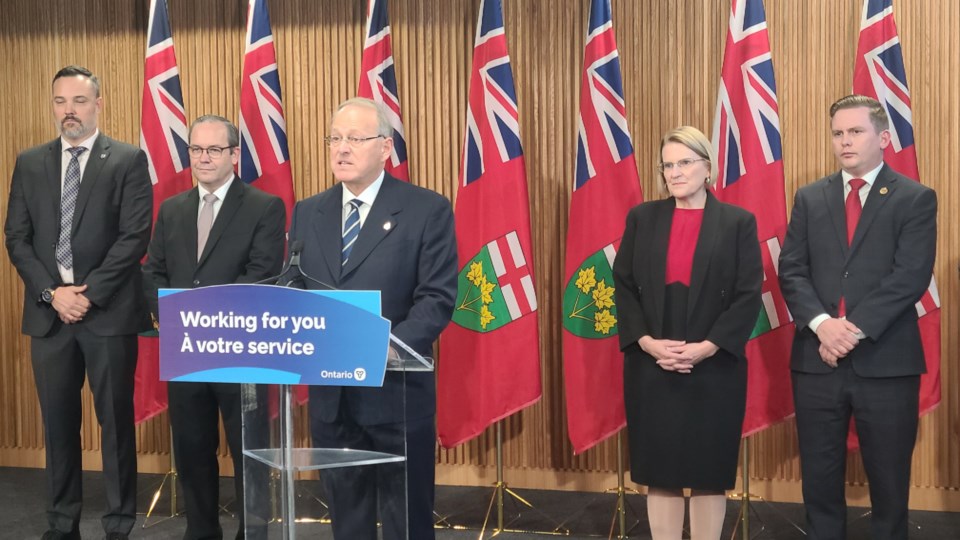EDITOR’S NOTE: This article originally appeared on The Trillium, a new Village Media website devoted to covering provincial politics at Queen’s Park.
The PC government has tabled legislation that will force the closure of 10 of Ontario's 17 supervised drug consumption sites and block municipalities from seeking permission from the federal government to open new ones.
It comes after months of warnings from public health workers, drug users, religious leaders, and public sector unions that doing so will cause increased opioid deaths and public drug use.
"There will be no further safe injection sites in the province of Ontario under our government," declared Health Minister Sylvia Jones during a press conference shortly after the introduction of Bill 223, the Safer Streets, Stronger Communities Act.
The omnibus bill contains several new "public safety" policies, one of which is the promised ban on supervised consumption (SCSs) operating within 200 metres of a school or daycare, which will force the closure of five facilities in Toronto and five others located in Ottawa, Kitchener, Thunder Bay, Hamilton and Guelph.
The PCs are also making sure that municipalities and public health units can't get around the de facto ban on new SCSs by asking the federal government for permission to open one and operating it without provincial funding. Bill 223 requires that cities first ask the province for permission before making any such requests.
"We don't want them bypassing and getting federal approval for something that we vehemently disagree with," said Jones, who added that "there is no circumstance" where she would ever grant such permission.
Ever since the closure of the SCSs was announced in August, many organizations have come to Queen's Park, begging the province to reconsider, arguing that by closing the sites, addicts will simply use drugs more in public, where they will not have someone watching over them to use Naloxone to reverse a potentially fatal overdose.
"Why doesn't the government want us to be safe? Don't we matter? We are people too. Please reconsider the announcement, you are killing us," Kensington Market Overdose Prevention Site client Jennifer Haier client told reporters at the legislature in September.
An internal Ministry of Health impact assessment obtained by Global News earlier this month echoed these concerns, warning the government that closing the SCSs could adversely impact people who already experience "disproportionately higher rates of opioid-related deaths," and will not fix the problem of discarded needles and crack pipes which the PCs have often cited as justification for the closures.
"There is an associated risk that closure of supervised consumption sites will make drug use and discarded drug paraphernalia more dispersed and more visible in the community," the impact assessment noted.
Asked why the government is disregarding its own findings — as it did earlier this year when it rejected recommendations supporting SCSs from a provincewide review it ordered in 2023 — Jones said the government is listening to regular Ontarians instead.
"We are listening to parents, we are listening to individuals who have to deal with this on a day-to-day basis," he said. "We have a lot of input that we use and provide and make assessments."
The government is planning to replace the SCSs with its new Homelessness and Addiction Recovery Treatment (HART) hubs, which Jones said will be open by March 2025.
When asked if SCSs would be allowed to remain open if the HART hubs are delayed for any reason, Jones did not answer.
Asked if she would guarantee there would be no increase in opioid deaths this time next year, she said that, by that time, the province "will be able to assess the efficacy" of the HART Hubs.
Bill 223 also contains several other policies.
It forbids registered sex offenders from legally changing their names, requires them to turn over emails and social media usernames to the police, and requires them to inform the police prior to travelling outside Canada. `
It also cracks down on the practice of "re-vinning" stolen cars, something federal Transportation Minister Anita Anand called on all provinces to take more seriously last month. The bill makes it an offence to knowingly submit or use a false Vehicle Identification Number, increasing fees for each subsequent offence.
Bill 223 also:
- bans the advertisement of black-market cannabis;
- exempts terrorism offences from the two-year limitation on civil lawsuits;
- proclaims November to be Community Safety and Crime Prevention Month;
- allows the solicitor general to issue more awards to police;
- gives police chiefs the ability to ask for temporary assistance from the OPP; and
- allows for new regulations to let retired judges work more part-time.
